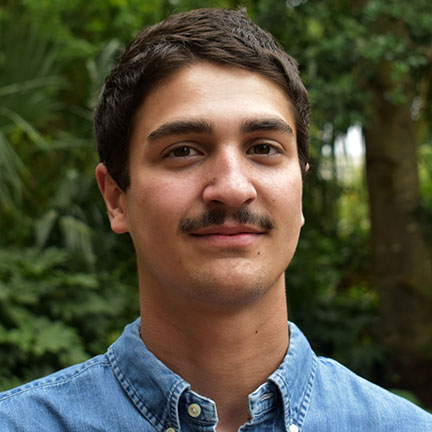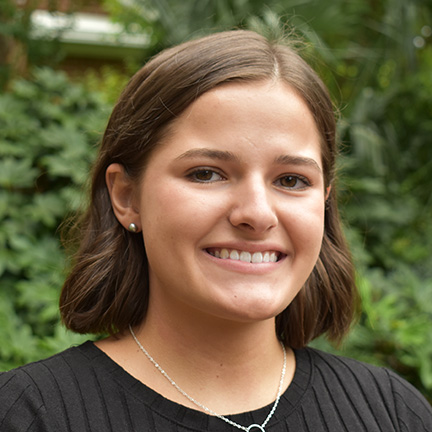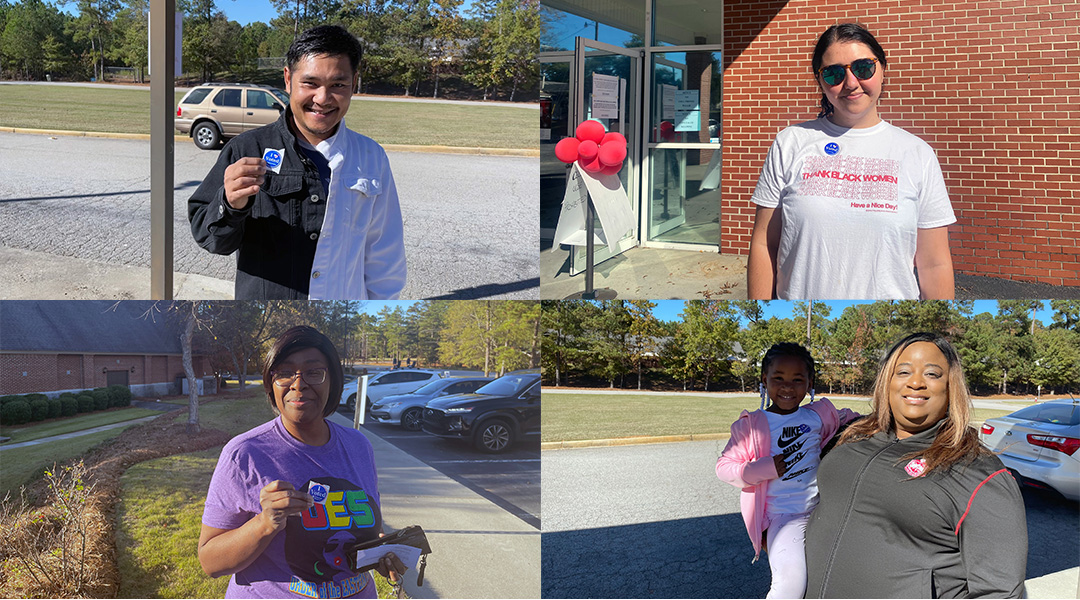Midlands voters proudly show off their “I voted” stickers. (Photos by Caity Pitvorec and Grace Tippett)
The Midlands faced common Election Day problems throughout Tuesday with high — but not record-breaking — voter turnout.
Richland County counted 128,302 votes total for a 47.32% turnout rate, according to SCVotes.com. Of the total, 45,864 were cast during early voting, and 4,887 were absentee ballots.
Richland’s turnout wasn’t record breaking. In 2018 — the last midterm election, two years after Donald Trump was elected — there were 142,805 votes cast on Election Day, according to the county’s election website.
Lexington County saw 100,035 votes cast in this election, with 29,237 ballots coming during early voting and 2,907 absentee ballots. That gave the county a 51.25% turnout rate. Lexington turnout wasn’t recording-breaking either.
Statewide, in 2018 South Carolina had 3,147,589 registered voters. As of Oct. 21 this year, there were 3,378,773 registered voters. During this year’s inaugural early voting period, which ended Saturday, 561,563 people cast ballots and 1,701,993 people voted. So Tuesday’s statewide turnout was 50.37%.
Joel Price, 73, has been the poll manager of the Leaphart Road precinct in Lexington County, which voted Tuesday at Pineview Baptist Church, for nearly 15 years.
Price said turnout depends on what type of election it is as well as what issues are being voted on.
“This will be a well-attended election because of what all you’ve got going on the ballot this year,” Price said. “In Lexington County, you’ve got the 1 percent sales tax — that’s a factor that a lot of people are concerned about.”
Shakaera Dickson, 27, voted at Cayce 2A’s polling center at New Bridge Academy.
She disagrees the county’s proposed penny-on-the-dollar sales tax, proposed to improve roads, is needed.
“I don’t think this really should happen, because no matter how much you’re fixing, our tires are still getting messed up,” Dickson said. “You still have potholes opening up, (the) metal plate system. … So, if you’re not going to really fix them, … I suggest you not raise taxes to benefit yourself.”
Krystale Eckrote, 39, also voted at New Bridge Academy. She said she likes the proposed penny tax.
“You know, anytime when it comes to taxes, it gets a little complicated,” she said. “Not too excited about raising taxes, but sometimes you have to do what you got to do.”
On the ground, there were mechanical problems with county machines early on. Throughout the day, there also was confusion over whether some people were at the correct precinct.
Dutch Fork 1 and Dutch Fork 2 precincts were consolidated. But many voters were unaware of the change.
On the Richland County Voter Registration & Elections website, the precincts were listed separately with no indication of the consolidation.
Samantha Vaccaro showed up to vote at Dutch Fork High School but found the doors locked and small signs saying the voting location had been “temporarily” moved to the middle school.
“It’s frustrating, because I’m here on my lunch break,” Vaccaro said. “It would be nice to know why it was moved, not just that it was temporarily moved.”
Cynthia Jones, a Dutch Fork 1 poll manager, said people were coming into the middle school frustrated about the change in voting locations. She said there was a line forming at the high school before people realized that no one was going to be let inside.
“The signs were too small for them to realize,” Jones said.
Jones wasn’t sure but said it was possible the voting locations were combined because smaller elections often draw fewer volunteers.
Those kinds of typical, administrative issues persisted until around 11 a.m. in spots across the county, Graham said. But it was a “smooth day” after that, with a few lingering issues, he said.
“For the most part, every election starts off — I don’t care what county or what state you’re in — you always have those issues first thing in the morning,” Graham said.
All day long, people complained in some precincts about receiving incorrect voting information and voter registration cards that sent them to the wrong precinct.
New cards will be going in the mail when this is all said and done, Graham said.
Tammy Lewis and her daughter-in-law, Barbara Lewis, went to Harbison 2’s New Heights Baptist Church in Richland County to vote but were sent by poll workers to another location. Their voter registration cards, sent by the state of South Carolina, had a wrong address.
Their registration cards said they should be voting at New Heights, but they were supposed to vote at the Harbison Community Center. The Lewises said they were frustrated about the mix-up and being told to go miles away.
“If anyone should be right, it should be the state,” Tammy Lewis said.
The Lewises were not the only ones with voting trouble.
Joseph Corbett, 57, went to the Westminster precinct at Westminster Presbyterian Church to cast his Richland County ballot. But he was unable to. His wife was able to vote.
“I’ve voted here since 2004,” Corbett said.
He pulled out his blue registration card. But poll workers said he wasn’t listed as a registered voter.
Other people simply hadn’t updated their registration information.
Graham said people being confused or not following instructions is typical of Election Day.
The only significant concern Graham said he saw was a disruptive man frightening and agitating voters at the county’s election office on Hampton Street. The man arrived around 3 p.m. and attempted to record a video on his phone inside the office’s voting location that’s used for provisional, or problem, ballots. Any such recording is prohibited under state law. After being asked to leave, the man refused and stuck around for more than two hours. Police were asked to keep him at bay.
“Every time he comes back in the lobby, the voters feel threatened and feel intimidated,” Graham said.
In other locations across the state, someone tried to steal a polling device used to sign in voters at a precinct in Allendale County, according to John Michael Catalano with the South Carolina State Election Commission. Chris Whitmire, state elections spokesman, later told The State newspaper that the man was a “known wanderer” and was likely trying to steal the poll book for its electronic value, not to disrupt voting.
There also was an issue at the Charleston County Election Commission headquarters in North Charleston, according to The State. A man who was told he could not vote at that location allegedly said, “I demand to speak with someone and I have weapons.”
According to Whitmire, the man left the building on a bicycle before being intercepted by police. He was put on a no-trespass notice.
But, mostly, people said going to the polls was meaningful to them. They braved technical issues or problematic ballots to vote for candidates or issues about which they are passionate.
Virginia Govan-Dysches, 52, voted at the St. Andrews precinct, at St. Andrews Middle School. She is a medical social worker and disabled vet and said this is an important election for her.
“I’m looking at medical issues, elderly — and definitely the vets and the care and services they’re receiving,” Govan-Dysches said. “And they’re not getting what they deserve.”
Tim Smith, 62, is a longtime Midlands resident and owner of Papa Jazz Record Shoppe in Five Points. He voted at Brookland United Methodist Church at the West Columbia 1 precinct.
He said local politics affect small businesses. He sees this as a business owner.
“I always vote,” Smith said. “I mean, I don’t win very often, but I always vote.”
Caity Pitvorec, Michael Sauls, Grace Tippett, Jack Veltri, Kaylie Pomichalek and Leah DeFreitas contributed to this reporting.
ABOUT THE JOURNALISTS

Stephen Pastis
Stephen Pastis is a senior journalism major at USC, where he is the arts and culture editor of his college paper, The Daily Gamecock. He writes about state politics, Columbia culture and technology. He is also working on an investigative story into the intricacies of trash management in the state. Most recently, he covered state politics for The State Newspaper as an intern, reporting on primary elections, abortion and immigration.

Hanah Watts
Watts is a junior multimedia journalism major with a minor in applied computing. A noted skeptic, Watts spent five months on a long-form story about the history and cultural significance of paranormal research in South Carolina. She scoured through music archives, Great Depression era texts, and centuries of newsprint – debunking such myths as USC’s Third-Eye Man in the process. Watts also reports on outdoor recreation and environmental law. Watts plans on studying constitutional law upon graduation.


